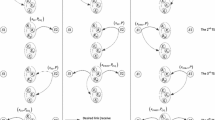Abstract
This paper investigates the problem of constructing a secret error-correcting multisource network coding scheme against an adversary that can re-select the μ tapping links in different time slice and inject z erroneous packets into network, and the network suffers from ρ packet erasures. In our network scenario, multiple sources transmit information to one or more receivers and these receivers request the information from all the sources. Firstly, a necessary condition is derived for keeping the transmitted information from multisource nodes are secret from the eavesdropper, while the network is only subject to the eavesdropping attack. Subsequently, we provide two multisource network coding schemes for error and erasure correction which can decode the transmitted information correctly. After that, a secret and reliable multisource network coding is proposed. This scheme can retrieve the original information secretly and accurately from the corrupt and deficient information. Meanwhile, it can obtain an asymptotic achievable rate of k − 2z − ρ − 3μ. Moreover, the intermediate nodes are oblivious to the concrete encoding and decoding algorithms implement in source and destination nodes. Finally, security and performance analyses illustrate the advantages of our proposed scheme.
Similar content being viewed by others
References
Ahlswede R., Cai N., Li S. R., Yeung R. W. (2000) Network information flow. IEEE Transactions on Information Theory 46(4): 1204–1216
Rouayheb, S. Y. E., & Soljanin, E. (2007). On wiretap networks II. In Proceedings of IEEE international symposium on information theory (ISIT 2007) (pp. 551–555).
Silva, D., & Kschischang, F. R. (2008). Security for wiretap networks via rank-metric codes. In Proceedings of IEEE International Symposium on Information Theory (ISIT 2008) (pp. 176–180).
Zhang, P., Jiang, Y., Lin, C., et al. (2010). P-coding: Secure network coding against eavesdropping attacks. In Proceedings of IEEE INFOCOM 2010 (pp. 1–9).
Nutman, L., & Langberg, M. (2008). Adversarial models and resilient schemes for network coding. In Proceedings of IEEE international symposium on information theory (ISIT 2008) (pp. 171–175).
Ngai, C.-K., & Yeung, R. W. (2009). Secure error-correcting (SEC) network codes. In Proceedings of workshop on network coding, theory & applications (pp. 98–103).
Yao, H., Silva, D., Jaggi, S., et al. (2010). Network codes resilient to jamming and eavesdropping. In Proceedings of IEEE international symposium on network coding (pp. 31–36).
Silva, D., & Kschischang, F. R. (2010). Universal secure error-correcting schemes for network coding. In Proceedings of IEEE international symposium on information theory (ISIT 2010) (pp. 2428–2432).
Silva D., Kschischang F. R. (2011) Universal secure network coding via rank-metric codes. IEEE Transactions on Information Theory 57(2): 1124–1135
Shioji E., Matsumoto R., Uyematsu T. (2010) Vulnerability of MRD-code-based universal secure network coding against stronger eavesdroppers. IEICE Transactions on Fundamentals of Electronics, Communications and Computer Sciences E93-A(11): 2026–2033
Jafari, M., Fragouli, C., & Diggavi, S. (2008). Noncoherent multisource network coding. In Proceedings of IEEE international symposium on information theory (ISIT 2008) (pp. 817–821).
Jafari, M., Fragouli, C., & Diggavi, S. (2009). Code construction for multiple sources network coding. In Proceedings of MobiHoc 2009.
Mohajer, S., Jafari, M., Diggavi, S., et al. (2009). On the capacity of multisource noncoherent network coding. In Proceedings of information theory workshop (ITW 2009) (pp. 130–134).
Vyetrenko, S., Ho, T., Effros, M., et al. (2009). Rate regions for coherent and noncoherent multisource network error correction. In Proceedings of IEEE international symposium on information theory (ISIT 2009) (pp. 1001–1005).
Yao, H., Dikaliotis, T. K., Jaggi, S., et al. (2010). Multiple access network information-flow and correction codes. In Proceedings of information theory workshop (ITW 2010).
Dikaliotis, T. K., Ho, T., Jaggi, S., et al. (2011). Multiple-access network information-flow and correction codes IEEE Transactions on Information Theory, 57(2), 1067–1079.
Chen, S., Wu, M., & Lu, W. (2011). Secret error-correcting network coding against eavesdropping and pollution attacks. In Proceedings of international conference on information systems and computational intelligence (pp. v1-140–v1-145).
Chen, S., Wu, M., & Lu, W. (2011). Counteracting malicious adversaries via secret and reliable coding mechanism in random network coding. International Journal of Communication Systems. (Published online in Wiley Online Library). doi:10.1002/dac.1359.
Silva D., Kschischang F. R., Koetter R. (2008) A rank-metric approach to error control in random network coding. IEEE Transactions on Information Theory 54(9): 3951–3967
Jaggi S., Langberg M., Katti S. et al (2008) Resilient network coding in the presence of byzantine adversaries. IEEE Transactions on Information Theory 54(6): 2596–2603
Author information
Authors and Affiliations
Corresponding author
Rights and permissions
About this article
Cite this article
Chen, S., Wu, M. & Lu, W. Secret Error Control Codes Against Malicious Attacks in Random Multisource Network Coding. Wireless Pers Commun 69, 1847–1864 (2013). https://doi.org/10.1007/s11277-012-0666-7
Published:
Issue Date:
DOI: https://doi.org/10.1007/s11277-012-0666-7




